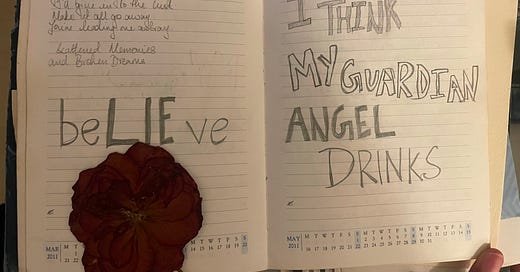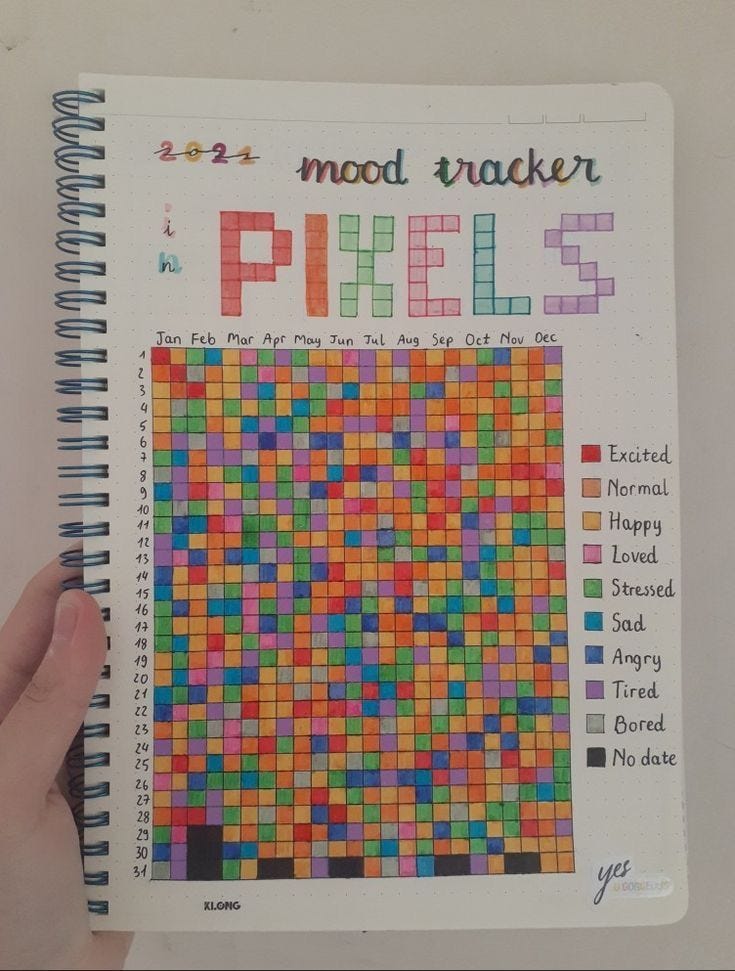Journaling: an act of training of the self by oneself
field notes, self-writing, first person accounts, autobiography - exploring autobiographical writing as acts of training of the self by oneself
In 2011, I coerced my father into buying me a $15 dossier. A rather expensive journal to house the deep, discomfitted thoughts of a 13-year-old, but I still have it with me. In this dossier, now live pubescent love letters from 2-day boyfriends, receipts from toll booths, and passionate poetry for a young man named Leonard (whom I met just the once).
A living, breathing document of what it was like to be me from age 13 to age 16.
I didn’t write in this book often, only turning to it on days when tears were not release enough. When my mother didn’t understand me, when it felt too much to be a growing young woman in a class full of shackled testosterone, when Leonard told my friend he already had a girlfriend.
It felt like so much lived inside of me, everything was happening for the first time. I couldn’t stop myself from writing, writing in poetry, writing in stories, writing in essays, and fieldnotes.
Skip a few years, and everything has happened too many times. I have to look up ‘journal prompts’ and walk myself to my desk at 7 AM to write my daily Morning Punishment.. sorry Pages. The overstimulation of routine, of working and socialising in equal measures, the numbness that comes from outgrowing a friendship, etc.
But living, breathing document it remains – what it’s like to be 25, then 26, then 27.
Because the years pass by unprompted. Like a beautiful man you meet in the club, dancing together, eyelids half shut, smiling, and he says he’ll be back in a second, until you turn around and look out the window, and he’s leaving without saying goodbye. (I feel like I should apologize for this misplaced metaphor)
Sometimes I feel that writing and documenting is the only way to truly live live in the ephemerality of the everyday. The pleasure of doing, and the pleasure of remembering and reiterating.
We write to taste life twice - Anais Nin
Is there a point? I’ve seen people online call journaling self-indulgent and cast it aside as a largely feminine undertaking. Not many, but enough.
The point is that you have the unique opportunity to know how not to drown in the surround sound cacophony of your own brain.
The Problem with Over-Romanticising a Thing
In my journal, my thoughts feel real. Here. Now. Insurmountable in the veritable truth of their existence. I am sad, means I am sad. You can’t run away from a sentence that reads “I need to work on my ability to show up for people, regardless of how inconvenient it is for me.”
These are the kind of sentences that are hard to think, let alone write, but they must be written. How can you alchemize inability into an attempt without first declaring your intention of effort?
I think you shouldn’t overtly romanticize a thing that’s meant to be a container of the only place your thoughts are allowed to be in their truest, most raw form. How can you reduce how you feel throughout the day by colouring a box yellow?
I can understand that these formats are created so that tapping into your emotions feels more approachable. But I think that getting caught up in maintaining the colours of these feeling maps and the habit trackers is fun, but they are a distraction.
Where is the nuance for feeling jaded when you wake up, then hopeful when you receive a nice email, ennuied as the post-coffee afternoon slump hits, and excited when it’s time to go back and cuddle in bed with your dog?
Perhaps the case really is to not confuse one for the other.
Bullet journaling and trash journaling are an analog creative release; to record life with pretty trackers, and calligraphied headers.
A personal journal is an autobiographical undertaking; a scream into the void, a silent sigh onto the page, a recount of the monotony of loneliness. If you think of it, it’s the only place other than your brain where your thoughts, unpolished and bare, will exist. Unless you’re a memoirist or something.
Journaling as an Act of Self-Creation
Journal writing is not only a process of self-recording, self-exploration, and self-expression, although it is all of these. It is also a channel of self-creation. We create ourselves in the very process of writing about ourselves and our lives.
Through reflecting on the concrete reality of our own immediate experience, and through giving voice to our perceptions, intuitions, and "felt sense" of things, we create ourselves anew.' Often, we bring this new and ever-evolving self into the external world surrounding us, in turn, and a dynamic relationship between the diarist's inner and outer worlds ensues.
- Marlene A. Schiwy, Taking Things Personally: Women, Journal Writing, and Self-Creation1
Michael Foucault explained the Greek concept of Hupomnemata, translated as self-writing, by saying that just as no profession, and no concept, can be conquered without exercise and the art of practice, how can we expect life and the very art of living to be learned without the training of the self by oneself.2
Many people decipher their thoughts through their writing, and many even start Substacks for just this purpose (some of these ‘thought-exercise’ writings might be better off left private, but that’s an argument for another day). But this need to work out the jumble of concepts, thoughts, and ideas that live in our brains, working them out on paper or keyboard, is actually an evolved instinct. An instinct to witness our own thoughts.
The journal or diary is a space for self-witnessing, fueled by a need not to allow life to just pass by. By choosing to sit in witness of your own thoughts and circumstances, you’re holding time captive between the sheets of an (overpriced) Leuchtturm journal.
The very act of documenting history is an act of collective journaling. We do not exist in a void of time; we exist in parallel to it. And self-writing is essentially writing our own history, documenting a past self, to act as a field guide for the present self, and as a witness of history for our future selves.
In an interview, David Sedaris said that things don’t really happen in his life until he writes about it: “If I could write it on paper, then I could just hold it in my hands long enough to make sense of it.” It’s a prescription for existentialism and a tangible self-awareness. Holding thoughts long enough to study them, and through this study and space for emotions, you fashion a future self that is better equipped with deep knowledge of the self.
There’s a book called Existential Psychotherapy by Irvin Yalom, which says that human beings have 4 ultimate concerns in life: death, isolation, freedom, and meaninglessness3. By their very nature, all of these concerns are both inescapable and difficult to confront, which is exactly the reason why we break them down into smaller, more surmountable fears. Death becomes the fear of not doing enough, freedom becomes compulsivity, isolation becomes hyperindependence, and the fear of meaninglessness becomes hedonism.
Obviously, journaling is not my blanket recommendation for these fears. Please go to therapy.
But I would venture to argue that self-reflection4 and deep knowledge of oneself are the only way through which therapy can even be effective. An evolution of self from documentation, sort of like how one might keep an account book for expenditures (not that I would know what that’s like)
The same study describes ‘self-writing’ as becoming the film director and the protagonist of your own story – and that’s an analogy I’ve come to really like.
Making the simple act of writing first-person accounts in your little blue journal a deeply self-creative activity. Taking control of your own narrative, and by being in dialogue with yourself, you become the plot director of your own life.
Schiwy, M. A. (1994). Taking things personally: Women, journal writing, and self‑creation. NWSA Journal, 6(2), 234–254. Retrieved from https://www.jstor.org/stable/4316329
Foucault, M. (1983, February). Self writing (Hupomnemata) [Translated seminar transcript]. Michel Foucault Info. Retrieved July 14, 2025, from https://foucault.info/documents/foucault.hypomnemata.en
Ashworth, D. (2019, January 25). The four ultimate concerns in life [Blog post]. Damon Ashworth Psychology. https://damonashworthpsychology.com/2019/01/25/the-four-ultimate-concerns-in-life/
Faccio, E., Turco, F., & Iudici, A. (2019). Self‑writing as a tool for change: The effectiveness of a psychotherapy using diary. Research in Psychotherapy: Psychopathology, Process and Outcome, 22(2), 256–264. https://doi.org/10.4081/ripppo.2019.378







We love to see and read it!!